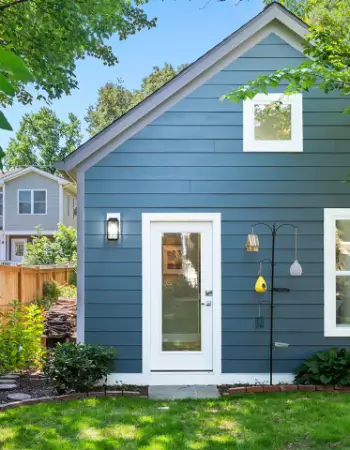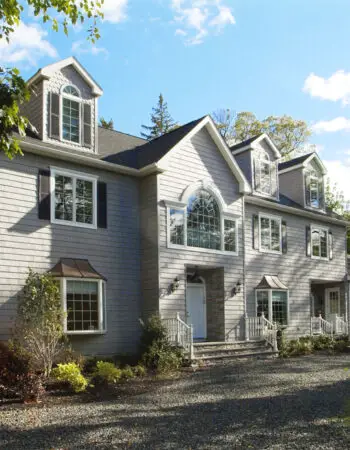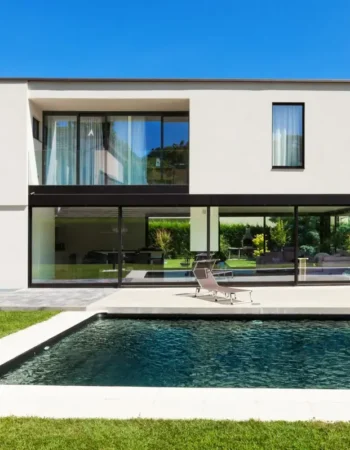Modular homes are FHA approved, and while it is more common to obtain an FHA loan for an existing home, the option of an FHA construction loan is possible, even for a modular home. There is no substantial difference between financing a modular or a site built home, since even though the modular house is built in a factory-like setting, it will be permanently assembled on the site’s foundations, built up to the building codes required for any permanent house and once finished, it will be considered a real estate property just as a site built home.
Therefore, a modular home can be approved for a variety of loan options and the construction method won’t become an impediment to it. However, to know if our modular home qualifies for an FHA loan there are other aspects we need to consider:
- Requirements for an FHA Construction Loan
- FHA One-Time Close Loan vs. Conventional Construction Loan
- Other low down payment financing programs
The FHA is a low down payment mortgage that offers great advantages and makes it easier for borrowers to qualify for it. While it is possible to be approved for a modular home FHA construction loan, it is important to take some time to consider if an FHA loan is the right fit for your modular home financing program.
An FHA construction loan is possible, even for a modular home
An FHA loan is a mortgage insured by the Federal Housing Administration or FHA and provided by an FHA approved lender [1] such as a bank or a financial institution.
It is designed to help low to moderate income Americans residents qualify for financing their house, and it is possible to be FHA approved when building a customized modular home with a construction loan.
The FHA offers a “One-Time Close Loan” allowing borrowers to build their own home (including modular construction) financing the lot purchase, construction and even the permanent mortgage once the house is finished, all at once [2].
This loan is often referred to as the construction-to-permanent loan by the approved lenders [3]. Unlike conventional loans, the One-Time Close Loan covers the entire process with one unique loan and only one mortgage closing which occurs prior to construction [4].
Requirements for an FHA Construction Loan
To be approved for an FHA One-Time Close Loan the borrower, the property and the contractor must meet the next requirement [4,5,6]:
- FHA loans apply exclusively to primary residence homes that you intend to occupy within 60 days after construction. The new property should be the borrowers home address; holiday or investment properties do not qualify for an FHA construction loan.
- The minimum down payment required is 3,5%.
- The minimum FICO score to qualify is a 580. Even though it is possible to be approved for an FHA loan with a FICO score of 500, the required down payment in this case will increase to 10%.
- The borrower is required to have a clean credit history. In case of bankruptcy, the borrower must wait a minimum of two years to qualify for the FHA One-Time Close loan.
- The borrower is required to verify their monthly income for the past two years. Both employers and self-employed borrowers can be approved as long as their income is verified through pay stubs, federal tax returns or bank statements.
- The borrowers Debt-to-income ratio (DTI) should not exceed 43% of monthly gross income. Borrowers with a higher credit score might be able to qualify for a higher DTI.
- The contracted builder must be a licensed FHA general contractor.According to the FHA guidelines the borrower is allowed to act as their own contractor as long as they are a licensed general contractor. However, the FHA is not the lender and most approved FHA lenders don’t accept this guideline, refusing to borrow money to self-contractors and requiring the borrower to hire an external licensed FHA general contractor.
- The borrower must either buy the land at the closing of the One-Time Close loan or have had owned the land for less than 6 months’ prior the case number assignment.
FHA One-Time Close Loan vs. Conventional Construction Loan
Both FHA and conventional loans are possible financing options for the construction of a new modular home. The process for financing a modular home is similar to a site built construction, with the added benefit that it is more likely to receive a lower interest rate with a modular home than with a site built home since the industrialization of the process in a controlled environment ensures a lower risk [7].
The construction technique of your real estate property doesn’t dictate the choice of an FHA over a conventional loan, the choice between these two options is either based on a personal choice or on an economical requirement.
The main difference between an FHA One-Time Close loan and a conventional loan is that FHA loans are easier to qualify for, allowing those with lower credit scores to be eligible for financing programs. Those who would be rejected from a conventional financing program because their economic situation doesn’t match the high standard of most conventional lenders, have the possibility to be approved by an FHA loan. This is possible because the FHA is not the lender but an agency of the U.S. government that offers an opportunity to lower credit scores holders by insuring and protecting the lender against the possible losses.
Lower credit scores and down payments are often the reason for considering an FHA loan, yet these benefits carry the unavoidable fact that over time an FHA loan will become more expensive since lower down payments translate to a higher interest over the loan’s life [8].
Though not all the differences between these two are based on an economic reason. The One-Time Close loan, the FHA loan that allows the borrower to build their own customized house, has a great benefit over conventional construction loans which is one single loan covers the whole process: land purchasing, the house construction (even if that one is modular) and the permanent mortgage of the completed house.
Most conventional construction loans on the other hand, will require two separate closings, one to qualify for the construction itself and one to convert it into a permanent mortgage [2].
The next table summarizes the main differences between an FHA One-Time Close loan and a conventional Construction Loan:
| Conventional Construction Loan [9] | FHA One-Time Close Loan | |
| House purpose | All purposes (primary residence, second home, investment or rental property) | Only primary residences |
| Minimum down payment | 3% to 20% | 3.5% |
| Minimum FICO score | 620 | 580 or even 500 increasing to 10% down payment. |
| Loan terms | 8 to 30 years | 15 or 30 years |
| Interest type | Fixed or adjustable rate | Fixed rate |
| Mortgage insurance | Lower cost | Higher cost |
| Cancellable when equity reaches 20% | Yes | No |
| Requalifying for permanent loan after construction | Necessary | Already closed before construction |
Other low down payment financing programs
The FHA One-Time Close loan is one of the financing possibilities to obtain a low down payment mortgage for a modular home construction. However, if it is not the right fit for your own situation, there are other programs that might offer a better solution:
- Homered Fannie Mae program.Is very similar to the FHA program, catering to the same profile of borrower but with some small changes that might fit you better in case the FHA loan isn’t the exact match for you. While the HomeReady program requires a credit score of 620, which is higher than the one required by the FHA, it has lower down payments and a higher DTI limit [10].
- VA One-Time Close is designed for active duty members of the U.S. military, veterans or their surviving spouses. It offers a simplified financing program to reduce the complications of the frequent relocations that are common in the military life [11].
- USDA loan is another government program primarily focused on rural areas and even though the requirements vary depending on the location, it offers the possibility to get a 100% financing of the house with no down payment at all.
Is the FHA loan the right fit for your modular home financing program?
While an FHA loan offers ideal benefits for a great amount of borrowers, it is designed with a very specific type of borrower in mind which may turn this mortgage into an inconvenience if you differ from this profile.
The FHA loan will follow the same requirements and guidelines for both modular and site build homes, so while the construction technique shouldn’t be the reason for one financing program or another, there are other aspects to consider the FHA One-Time Close Loan as the right financing program for your modular home:
- You are having trouble qualifying for a conventional mortgage.
- The down payment required by other loans is too high for you.
- Your FICO credit score is lower than 620. You can qualify for an FHA loan with a credit score as low as 500.
- The house you want to finance will become your primary residence.
- You are planning to buy the land at the moment of construction or have already owned your own land (for no longer than 6 months).
- You don’t expect to grow your income and prefer to stay with a fixed rate from start to finish.
- Want the comfort of just one loan and one closure for both the construction process and the permanent mortgage once the house is built.
Notice that the FHA requirements might be updated so it is always good to check with your FHA approved lender.
Moreover, every lender might establish their own requirements in addition to those dictated by the FHA since they are not the actual lenders and their requirements are designed as a guidance to provide a backup for you and the lender.
References:
- The Federal Housing Administration (FHA) U.S. Department of Housing and urban Development https://www.hud.gov/program_offices/housing/fhahistory
- FHA One-Time Close Loans FHA.comhttps://www.fha.com/fha_one-time-close
- Martin, E. J. (2021, April 14) FHA construction loan: Requirements and process for 2021 The Mortgage Reports https://themortgagereports.com/75182/fha-construction-loan-requirements-process#requirements
- (2021, March 12) What are the Requirements for an FHA One-Time Close Construction Loan? FHA.comhttps://www.fha.com/fha_article?id=1030
- Wichter, Z. (2021, July 28) FHA loans: Everything you need to know in 2021 Bankrate US https://www.bankrate.com/mortgages/what-is-an-fha-loan/ ,
- Araj, V. (2021, August 05) FHA Loans: Requirements, Loan Limits and Rates Rocket Mortgagehttps://www.rocketmortgage.com/learn/fha-loans
- (2019, March 28) Modular vs Stick Built Homes: A Comprehensive Comparison Design Build Modularhttps://designbuildmodulars.com/blog/modular-vs-stick-built/
- Marino, J. (2019, July 19) What is an FHA loan and how does it work? Opendoorhttps://www.opendoor.com/w/blog/what-is-an-fha-loan-and-how-does-it-work
- Ballinger, B. (2020, October 8) Conventional loan rates and requirements for 2021 The Mortgage Reportshttps://themortgagereports.com/21489/how-to-buy-a-home-conventional-loan-mortgage-rates-guidelines
- McGuinniss, M. (2021, February 11) FHA vs. HomeReady: Breaking sown different affordable loan options Better https://better.com/content/fha-homeready/
- VA One-Time Close Construction-to-Permanent Loan American Financial Resources (AFR) https://www.afrwholesale.com/va-one-time-close-construction-loan/



